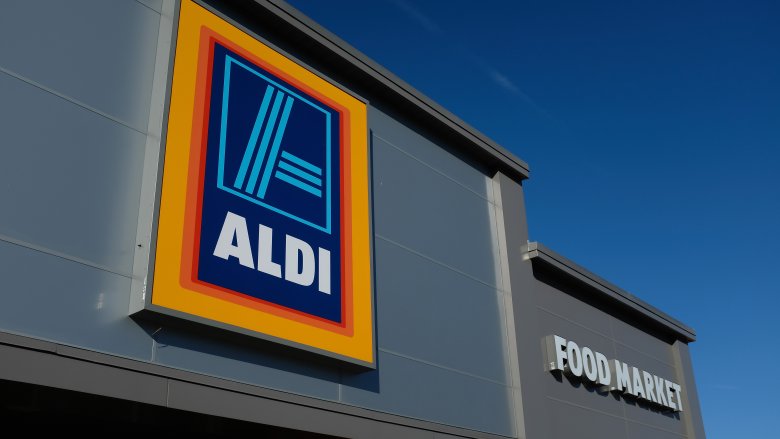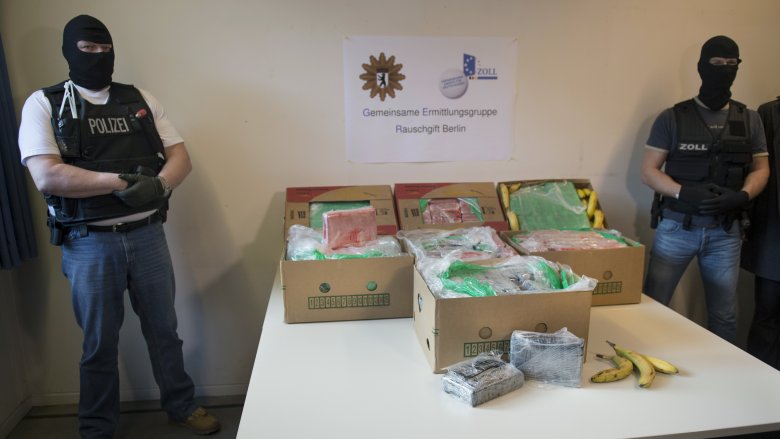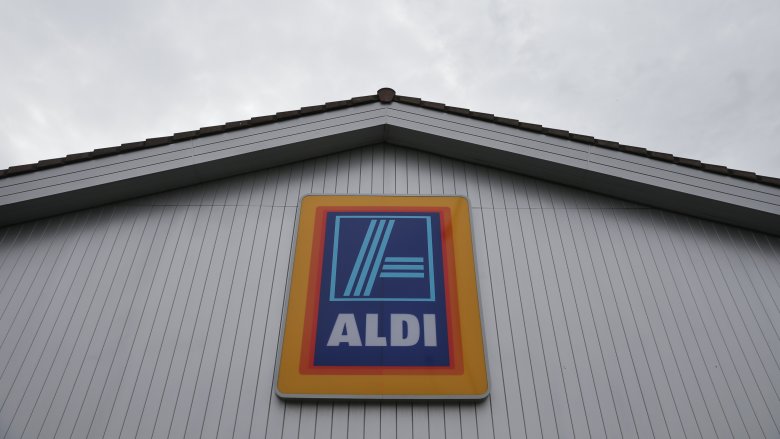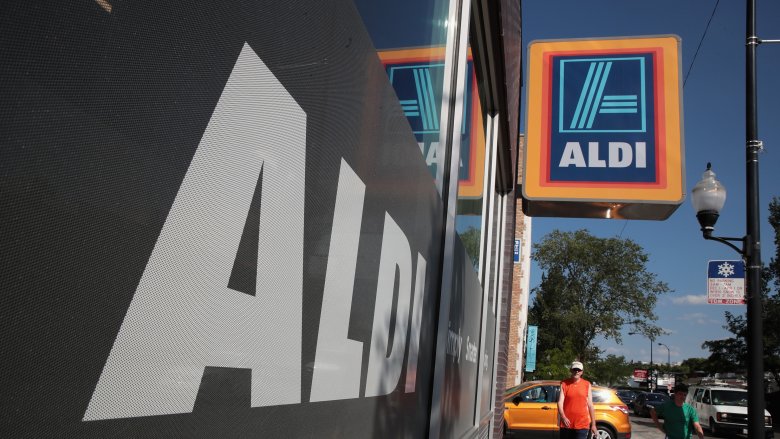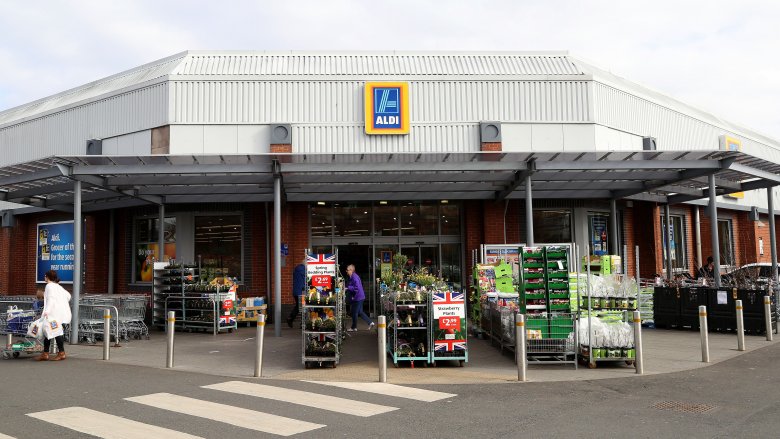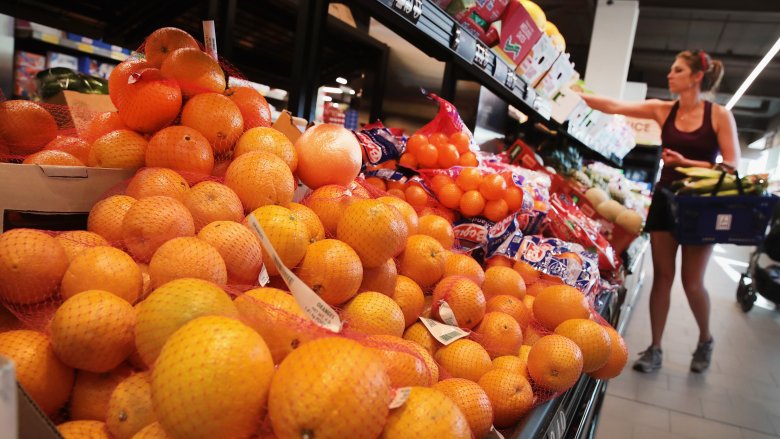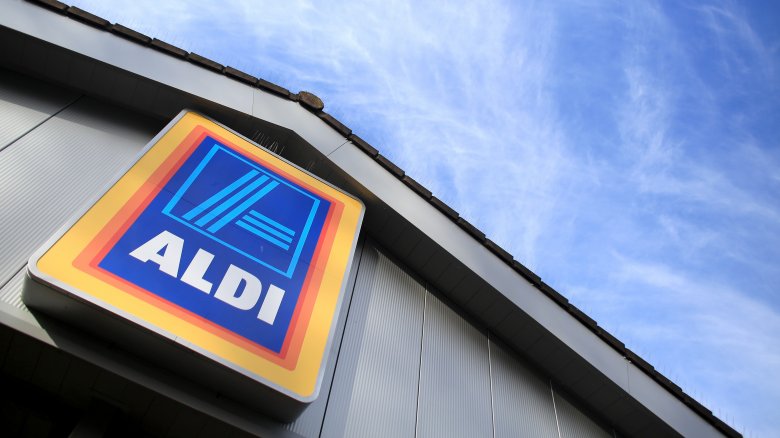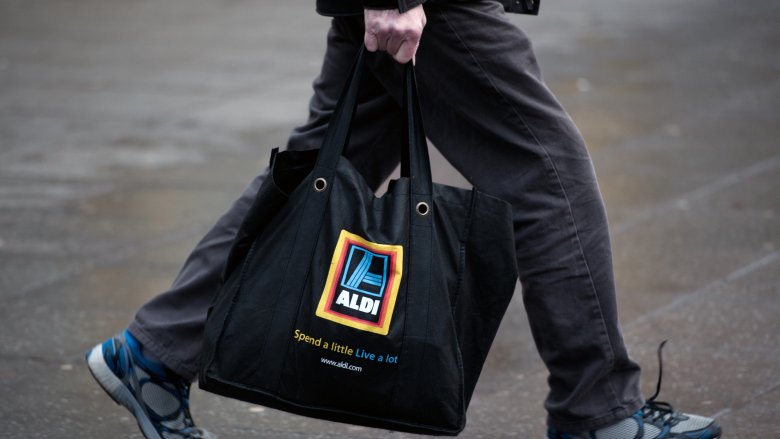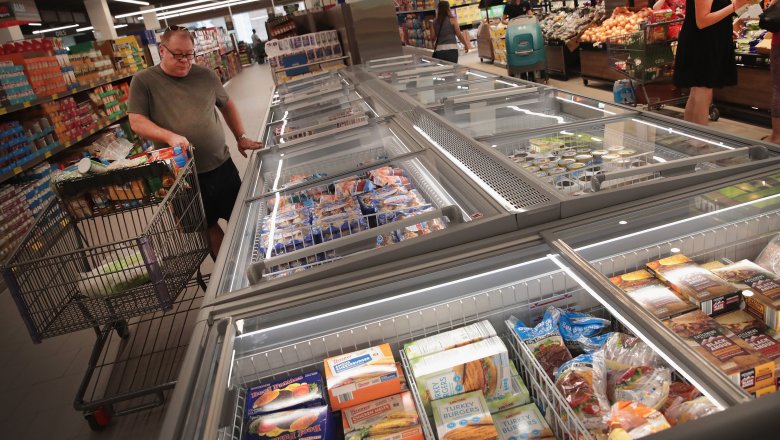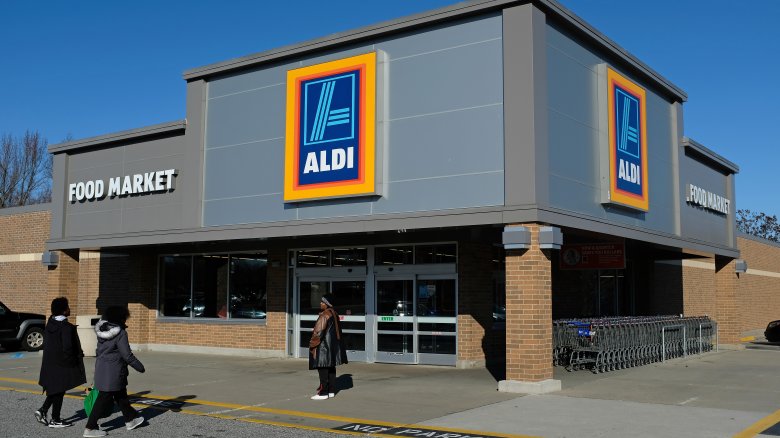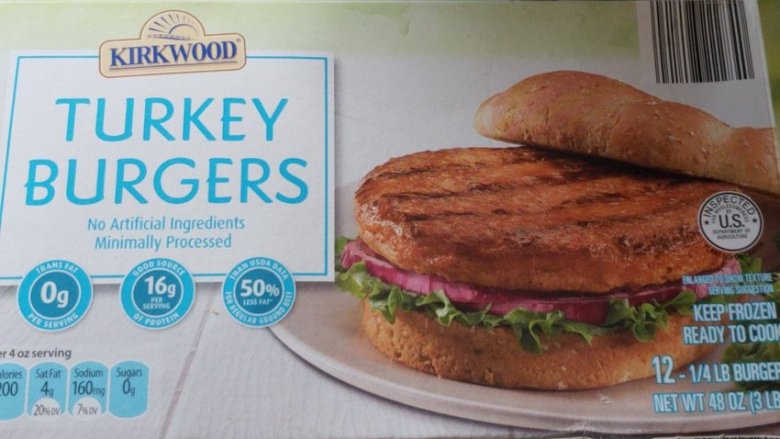Huge Scandals That Completely Rocked Aldi
So you're in love with Aldi for their commitment to bargain over brand and no-frills shopping experience. You love that they set themselves apart from other chains by never offering single-use plastic bags. It seems as though Aldi can do no wrong, right? Not so fast. Aldi may be a shopping force to be reckoned with that has expertly carved out a grocery legacy, but that doesn't mean their entire company history has been a bed of roses. We hate to burst your bubble, but Aldi has a few dark spots in its timeline. You didn't think this billion dollar company that conquered the grocery market in Europe, Australia, and the United States did so without making a few mistakes along the way, did you?
It's almost inevitable that a large worldwide company is going to have a few not-so-great-moments in its history. While some of Aldi's PR nightmares have certainly been their own fault, others were generally out of their control. Still, these scandals and business missteps are definitely incidents that the German grocery chain likely doesn't want to repeat anytime soon, or ever for that matter. From bogus products, to labor issues, and even murder, here are the biggest scandals that Aldi found itself wrapped up in.
Their bananas sometimes have a secret ingredient
Drug cartels will use any means necessary to hide their illegal cargo and it's actually not that uncommon for food shipments to be used for smuggling cocaine. Aldi has ended up with bananas have been used in drug trafficking on not one, not two, but at least three occasions.
In 2014, the company learned that 140 kilos of cocaine was hidden within its stock of bananas. Then, in 2015, the same thing happened again when bananas packed with cocaine were shipped to 14 different Aldi supermarkets around Berlin — worth approximately $16 million. At the time, the 386 kilo stash of cocaine was the largest amount seized in any single operation in the city. That shipment was small potatoes, however, to what would show up on Aldi's loading dock in 2019.
Six Aldi stores in Rostock, Germany discovered in April 2019 that their bananas contained nearly half a ton of cocaine with a value of almost $28 million. It was understandably a headache for the company, and an Aldi spokesperson confirmed that the banana shipment that came from Latin America affected the logistics center and numerous store branches — though further details were not provided. While Aldi didn't confirm what it planned to do with the bananas, it's probably safe to assume they weren't sold at a discounted price to the public.
They've been accused of funding North Korea's nuke program
So here's a rather strange set of implications regarding the bargain-priced seafood you buy at Aldi. It could be funding Kim Jong-un's nuclear weapons program. That's right, your fish sticks could lead to a nuclear war. Alright, no need to head to the bomb shelter just yet, it's a little more complicated than that...
Like so many other things Americans buy, a lot of our seafood comes from China. In order to cut costs, Chinese seafood processing plants employ a number of North Korean workers who in turn hand over as much as 70 percent of their earnings to the North Korean government. Thus, the seafood that is sold to Aldi and Walmart and then bought by Americans could be, in a bizarre way, inadvertently subsidizing North Korea's funds for their missile development program. It's actually a federal crime for products made by North Koreans to be imported to the United States, but that doesn't mean it's not happening because of the sheer amount of fish generically packaged and shipped out. It's estimated North Korea could be bringing in as much as $500 million a year by loaning its workers to China.
Besides possibly aiding North Korea's missile program, the North Korean workers work in what has been called "modern day slavery" conditions. The controversy definitely doesn't make Aldi look good and protests have even been staged outside of Aldi supermarkets calling it the "ultimate betrayal of American trust."
Worker abuse claims have put them in a bad public light
Aldi employees have complained about grueling working conditions before, but it's a whole other ballgame to claim that your employment with the company was basically slave labor. In 2017, two Korean nationals claimed that while working at an Aldi supermarket in Australia, they were "treated like slaves," and were paid little to nothing of the money they had worked for.
Youngpil Ko and Gyeongho Oh said they were employed at a store in Brisbane for five weeks, and unloaded and wrapped pallets during 10-hour shifts. A labor-hire firm provided transportation costs, which was taken out of the men's pay, but Ko and Oh claimed that $5,000 owed to each of them was never paid out. Because the men were hired through a labor firm and not directly through Aldi, it only complicated matters more. As for Aldi's role in the scandal, the company largely denied the claims but said an investigation was being done and that it "takes all allegations of misconduct relating to our contractors seriously..."
It's not just store employees who have made claims of being mistreated by Aldi, but the workers who make its products as well. The company came under fire in 2017 after allegations that the Bangladeshi workers who made clothing sold in the supermarket chain were being paid "poverty wages." A representative for Aldi said its suppliers were required to abide by "national laws and Aldi's social standards in production."
They've been accused of cultural appropriation
While social media may have opened up a new frontier for how brands reach their customers and market products, it has some major drawbacks, too. Any new product that a brand rolls out these days is at the judgement of social media and hoo-boy, does social media ever judge harshly.
In May 2019, Aldi announced that some of its European stores would be carrying square-shaped sausage patties. The purpose was to prevent cylinder shaped sausages from rolling off the plate or out of a breakfast sandwich. The grocery store chain even decided to call them "sausedges" to be cute. Harmless enough, right?
Nope. Social media immediately jumped on Aldi and said the company was taking credit for Scotland's square Lorne sausages. Some angry folks even derided the company for cultural appropriation. Numerous folks on Twitter also accused Aldi of having claimed to have "invented square sausage," despite Aldi's tweet not making any such claim.
Various news outlets seized upon the social media backlash and even Aldi's competitor Lidl took a shot at them. Maybe Aldi should just stick to boring round sausages from now on.
A public execution left shoppers horrified
On the list of things that might cause a customer to never return to a specific business location, murder is probably pretty high up there. Shoppers at an Aldi store in North Yorkshire, England were unfortunately the witnesses to a brutal and undoubtedly bloody crime that took place just four days before Christmas in 2017.
Jodie Willsher, described by one of the store's managing directors as a "much-loved and popular colleague," was a single mother and employee with Aldi when Neville Hord entered the store and stabbed her to death in front of customers. Hord was bitter over his breakup with Willsher's mother and blamed Jodie for the split. He had reportedly planned the attack for weeks, accumulating knives, an ax, and crossbow with the full intention of carrying out the public execution to cause "the maximum pain, horror, shock, and trauma." He was sentenced to a minimum of 27 years in prison.
While the murder was no fault of Aldi's, horrific crimes are never good for business and such a thing could easily leave shoppers with an uneasy feeling and send them looking for a new grocery store.
They've been accused of spying on employees
Keeping an eye on employee performance is one thing, but secretly installing hidden video cameras in staff locker rooms is over the line. In 2013, news broke that a store detective who was hired by Aldi to keep an eye out for shoplifters was also ordered by store supervisors to spy on Aldi staff.
"I had to say if an employee was working too slowly, engaged in an affair, and reveal other private details such as their financial situation," the store detective who chose to remain anonymous said.
Aldi didn't confess to the spying, but somewhat sidestepped its denial of the allegations. While the company said such spying was never ordered, a corporate consultant for Aldi said it was "not implausible" that individual supervisors at a store had carried out the spying tactics on employees.
Unfortunately, this claim wasn't the only instance of Aldi supervisors secretly spying on people. A year earlier, a report surfaced that at some Aldi stores in Germany, managers were using video cameras not only to monitor workers, but to peek up the dresses of female shoppers. The company said that such practices were forbidden and that "appropriate disciplinary consequences" would be carried out.
One of their kitchen products might contain dangerous levels of lead
"Mmm, that's some refreshing lead in my ice water," said nobody ever. An Aldi kitchen tap caused a stir in Australia when about 12,000 units of the product that had been sold to the public were later declared potentially dangerous because of high levels of lead in the drinking water.
The issue was that Aldi said the Easy Home brand tap was safe, but the Queensland Building and Construction Commission said testing revealed the taps contained up to 21 times the maximum allowable amount of lead. Naturally, Aldi went on the defense, did their own testing of the tap, and deemed it safe. "Numerous tests of Aldi's Easy Home spiral spring kitchen mixer tap have uncovered inconsistent results and due to this uncertainty the QBCC's position about the safety of these taps remains unchanged," a QBCC spokesman said.
Health officials such as Brian Gulson of the Australia's National Health and Medical Research Council called the lead levels "way above the water guidelines" and advised against using it. "I wouldn't use the water from this tap," added Ian Rae, a chemistry professor at the University of Melbourne.
Aldi and the QBCC attempted to work together on testing of the tap, but as of September 2018, they've been unable to agree on final testing of the product.
They were accused of promoting a racist product
It's not just Aldi's square sausages that have backfired on them, but their Australia Day celebratory T-shirts as well. In 2014, Aldi decided to do what brands around the world do anytime a country has a national holiday coming up — capitalize on it. The grocery store chain advertised a series of T-shirts that would be available in its Australian stores that correlated with Australia Day (sort of like Independence Day in the States).
One T-shirt in particular did not sit especially well with Twitter, though, and it wasn't long before folks were calling Aldi's shirt "racist" and demanding that it be removed from shelves. The shirt in question read "Australia Est 1788." Critics of Aldi argued that the shirt ignored the Indigenous population who had inhabited the continent long before the Brits showed up. Like so many other squabbles on social media though, some argued the outburst was nothing more than a PC overreaction. Regardless, Aldi removed the shirt and released a statement, saying, "Aldi Australia wants its customers to know it puts the community and their wishes first."
Customers weren't happy about horse meat in their products
Regardless of cows and horses both being hoofed animals, people generally tend to shy away from eating the latter. So when customers are misled into believing the frozen food they're buying contains 100 percent beef, when in fact it's actually part or all horse meat, well... people aren't happy.
In 2013, news broke that Aldi, along with other UK supermarket chains, had found horse meat in their beef. In Aldi's case, it was their frozen meat lasagna and spaghetti bolognese – and not just a little bit of horse meat either. Tests were done on the products that revealed the impostor beef was between 30 and 100 percent horse. Aldi was under the impression it was buying its beef from suppliers in France and Ireland, however, that wasn't the case. The company eventually learned some of that bogus meat came from Romania.
"This is completely unacceptable and like other affected companies, we feel angry and let down by our supplier," an Aldi spokesperson said. "If the label says beef, our customers expect it to be beef."
The meat (which was never sold in the U.S.) was believed to be safe for consumption, but customers were still encouraged to return the products to the store where they were purchased. While Aldi never confirmed exactly how much the horse meat scandal — which affected other grocers as well – cost them, BBC news estimated the cost of the testing and lost sales to be in the millions, not to mention the presumably gun-shy consumers that were left in the scandal's wake.
Employees have sued them for wage theft
A wage theft lawsuit is never good for an employer's reputation and can potentially cost millions of dollars to clean up. Central New York Aldi employees prompted a nationwide lawsuit when they accused the grocery store chain of unpaid wages in 2016 and took legal action to ensure they got the money they felt Aldi owed them.
The lawsuit brought against Aldi by store managers claimed that they were doing much of the same tasks as hourly store employees, but those employees were getting overtime pay. Meanwhile, the store managers were working 60 to 70 hours a week and getting an average salary of $80,000 without overtime pay. News of the lawsuit spread throughout Aldi's American workforce and around 360 employees eventually signed on as clients.
While Aldi had initially argued that it didn't have to pay its managers overtime, it's sorta difficult for a company to ignore 360 disgruntled employees, and in 2019 Aldi agreed to a settlement. In total, Aldi settled the lawsuit for a hefty $9.8 million with some store managers receiving as much as $20,000 in back pay.
That's some serious overtime pay and a lesson that Aldi likely won't soon forget.
A customer sued them for an exploding burger
Burgers are supposed to give us joy — not burns and permanent scarring. That's what a Pittsburgh woman claimed her frozen burger from Aldi gave her though when it exploded in August 2018. Gloria Besley purchased Aldi's frozen Kirkwood Turkey Burgers and said that despite following the cooking instructions, things quickly went horribly wrong. (Cooking directions for the burger called for the frozen patty to be placed in a small amount of vegetable oil in a skillet over medium heat. Of course, anybody who's ever placed frozen food in hot oil knows a water/hot oil combination is never a good thing.)
Besley said that when the burger hit the oil, it exploded and left her with burns and permanent scarring on her hands and forearms. The unhappy customer claimed in her lawsuit that Aldi's product wasn't only unsafe for consumer use, but that the company failed to correctly give safe instructions for cooking it. Besley was asking for $35,000 for her burger burns, because she "has suffered a loss of the enjoyment of her usual duties, avocations, life's pleasures and activities, and the shortening of her life expectancy, all to her great detriment and loss." Who knew a burger could do so much damage?
By all accounts, the case has not yet been settled.
